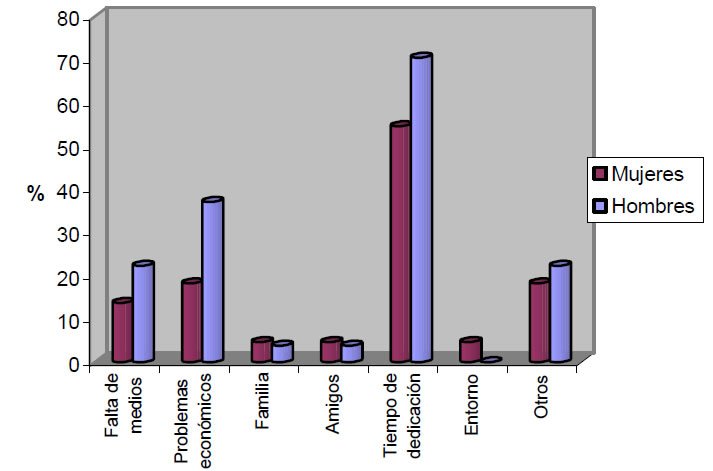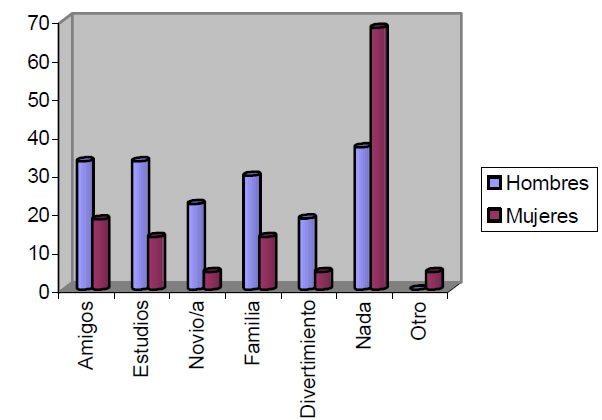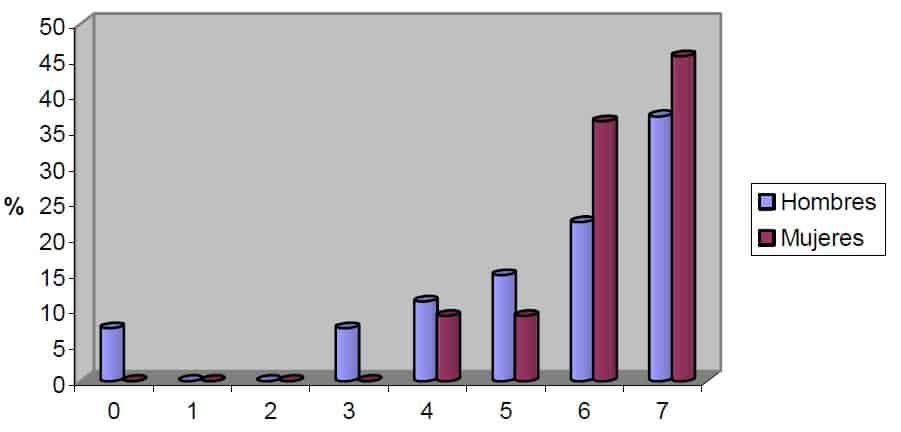Obstacles and benefits in sailing: gender differences
Resumen gender differences
The struggle for gender equality in sport is a subject always present in our society. This work is about the differences existing between sexes. The aim is to analyze some aspects of their sport career and the possible presence of discriminatory situations against women in National Spanish sample. At the end of the XIX century and during all the XX century in Europe, the participation of women in the social ambit has had an overwhelming increase. At the same time, little incursions of women began to appear also in sport, and finally, they started to compete in spite of many inconvenients. Nowadays, however, it is a well-known fact that women have the same interest in sports than men, as it happens in many other activities or professions. Even in Spain, at this moment, the number of women practising different sports has increased considerably. This is an important change in relation to the traditional masculine structures.
Introduction
The struggle for gender equality in sport is a subject always present in our society. This work is about the differences existing between sexes. The aim is to analyze some aspects of their sport career and the possible presence of discriminatory situations against women in National Spanish sample. At the end of the XIX century and during all the XX century in Europe, the participation of women in the social ambit has had an overwhelming increase. At the same time, little incursions of women began to appear also in sport, and finally, they started to compete in spite of many inconvenients. Nowadays, however, it is a well-known fact that women have the same interest in sports than men, as it happens in many other activities or professions. Even in Spain, at this moment, the number of women practising different sports has increased considerably. This is an important change in relation to the traditional masculine structures. Talking about Sailing, the situation in this 420 class in which men and women compete together, is very interesting in order to know the opinion of these participants in relation to the analysed questions. We study the benefits and obstacles that athletes find in the practice of sailing, what they had to sacrify to dedicate time to this sport, and their level of satisfaction over sport in general and about some aspects in particular. Our results did not evidence any relevant differences between men and women. However, women show a higher level of satisfaction than men and they hardly have to renounce to something in order to practice it.
Method
The method used was the distribution of questionnaires to a sample of sailors who participated to the Spanish Championship of Sailing of 420 class at Las Palmas de Gran Canaria from the 25th to the 30th of august 2005. The number of participants was 144 athletes (102 men and 42 women). Items were in relation to age and sex of participants, benefits and obstacles of the practise of sailing (financial problems, family, friends, the time of dedication, feelings of self-confidence, health, educations, discipline, entertainment, possibility of travelling and to meet new people, renounces in favour of practising sport (boyfriend, girlfriend, family, studies, entertainment), degree of satisfaction towards several aspects of this sport (trainer, club, National Federation, scholarships, calendar of competitions, facilities, and medical assistance and centre of high performance), existence of discriminatory sexual factors towards women. Results have been collected in a database that later has been treated with the SPSS v. 12.0.1 (SPSS Inc. Chicago, IL) to determinate if there is a relation between the variables with the static’s Chi-cuadrado de Pearson (?2). For all statistical analysis, a p value of 0.05 was accepted as the level of significance.
Results
Fig. 1. PCA de los encuestados en el Campeonato de España de Vela clase 420.
PCA (which represents 88.02 of the variance; Figure 1) has shown the inexistence of a difference between men and women in the whole of different topics. We can observe a bigger dispersion of men in comparison to women, but there is a tendency of both groups to gather around the same values showing an uniformity. The reason of the observed dispersion in the PCA is because of little differences in the answers of a few people in some items of the questionnaire. Age range of women sailers: 13-22 and age range of men: 14-28 years .Most of people had 16 years old (31.82% of women and 22.22% of men). The time of dedication is the main factor that affects men and women in order to continue their sport career. However, the greater difference found between the two sexes is the economic factor, that affects mainly the men (Fig. 2).
Fig . Obstacles in the practise of sailing (lacfalta de medios y infraestructuras ?2 = 0.596, P = 0.440; problemas económicos ?2 = 2.112, P = 0.146; familia ?2 = 0.022, P = 0.882; amigos ?2 = 0.022, P = 0.882; tiempo de dedicación ?2 = 1.306, P = 0.253; entorno ?2 = 1.253, P = 0.263; otros (estudios) ?2 = 0.122, P = 0.727).
Considerering the possible renounces of sailers in favour of their activity, we can say that women had not to renounce to anything to practice their sport. On other hand, men found a broader range of difficulties (Fig. 3).
Fig. 3. Renounciation for practice of sailing (amigos ?2 = 1.428, P = 0.232; estudios ?2 = 2.543, P = 0.111; novio/a ?2 = 3.093, P = 0.079; familia ?2 = 1.781, P = 0.182; divertimiento?2 = 2.203, P = 0.138; nada ?2 = 4.705, P = 0.030).
The turnings out benefits are mainly the chance to travel and meet new people (68.18%), besides an increase of self-confidence (54.55%). Men showed a higher consideration of all proposed aspects than women (Fig. 4), being entertainment and travelling (77.78%), and self-confidence (62.92%) the more appreciated benefits in the practice of sailing.
Fig. 4. Benefits of sailing as sport activity (autoestima ?2 = 0.356, P = 0.551; reconocimiento social ?2 = 1.428, P = 0.232; reconocimiento familiar ?2 = 1.428, P = 0.232; salud ?2 = 2.543, P = 0.111; educación y disciplina ?2 = 1.987, P = 0.159; diversión ?2 = 4.128, P = 0.042; viajar y conocer gente ?2 = 0.573, P = 0.449).
The satisfaction level towards sport is very high. However, there are some aspects which have not a good value. Little differences between sexes could be observed when considering the opinion of athletes on aspects such as scholarships, grants, and calendar of competitions, in which women have a more favourable opinion than men (Fig. 5a, b).
a
b
Fig. 5. Level of satisfaction for some aspects of mailing, men (a) and women (b) hacia algunos aspectos de la vela: (entrenador ?2 = 5.994, P = 0.203; club ?2 = 4.807, P = 0.308; federación nacional ?2 = 7.805, P = 0.099; instalaciones ?2 = 2.651, P = 0.618; becas ?2 = 6.146, P = 0.189; ayudas?2 = 6.475, P = 0.166; asistencia medica?2 = 2.909, P = 0.573; calendario de competiciones ?2 = 7.636, P = 0.106; centro de alto rendimiento ?2 = 4.576, P = 0.335).
In spite of obstacles and renounces, the level of general satisfaction for the practiced sailing sport is very high. We use a scale where 0 is the inferior value and 7 the maximum value. The results obtained are very similar between sexes. Broadly speaking, women have a bigger degree of satisfaction than men.
Fig. 6. General level of satisfaction for sailing as sport (?2 = 4.691, P = 0.455).
Most of participants stated that they have not suffered any discriminatory experience (Fig. 7a). On the contrary, we have to point out that 19.05% of women had suffered discriminatory experiences.
Fig. 7 a. Discrimination events (?2 = 2.861, P = 0.413).
Nevertheless, there is a high percentage of men (55.56%) that consider that the treat is different (Fig. 7b). In fact, men felt discriminated because they had to compete in order to obtain the classification and enrol at international competitions, while women had direct access.
Fig. 7b. Different treat when is a men or a woman who compete (?2 = 5.456, P = 0.065).
Conclusiones
1. Our results did not show any relevant differences between men and women about the compound of the considered topics. 2. The satisfaction level for general aspects of sailing was very similar between both sexes although women showed a more positive attitude. Both sexes pointed out their dissatisfaction with scholarship, high performance centres and the support of the National Federation and they revealed a very good opinion of their trainer, the club to which they belong and of the schedule of competition. 3. Women seemed not to be affected by economical problems: they had good chance for scholarships and help, they hardly had to renounce to something in favour of sport. 4. On the other hand, men considered that they had to sacrify personal and social relationships to dedicate time to this sport and also they were affected by economical effort that this sport needs. 5. Talking about the benefits, both sexes pointed out that the most important aspects are connected with the opportunity of enjoying their sport, travelling and meeting people. 6. Another advantage in this sport was an increase in their self-confidence. 7. Men found more positive aspects than women in practicing their sport, mainly in health and discipline. 8. Most of participants stated that they had not suffered discriminatory experiences by sex reason. Surprisingly, when they were asked about a particular treatment 8 received by women, men pointed out some favouritism that occurred in dependence of the limited number of women that sail.















